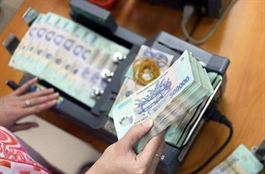VieON users in mire after exit of MoMo
VieON users in mire after exit of MoMo
Even as major e-wallet platforms enhance partnerships with businesses to gain a foothold in the local market, locally-invested MoMo has suddenly cancelled its contract with an over-the-top platform, raising concerns over whether the e-wallet platform is strong enough without the alliance.

VieON users in mire after exit of MoMo
|
Local over-the-top (OTT) platform VieON has been hit by the contract termination of M_Service JSC, an operator of MoMo. From the start of this month users of VieON have no longer been able to perform payments via MoMo, putting VieON operator DatViet VAC Media Entertainment Group in adversity.
According to DatViet VAC, around 45 per cent of users selected MoMo for their payments. “That means they cannot extend their packages on the platform due to the interruption,” said the company’s representative.
In mid-July, M_Service sent a notification of contract termination to VieON, citing that it had “temporarily no demand for trading in the company’s products and services.” The following week, representing DatViet VAC, law firm Duane Morris LLC sent a document to reject the e-wallet platform’s intention of halting the contract. Not long afterwards, the two sides held an online meeting to hammer out more acceptable terms, but no real outcome was forthcoming.
As the two sides failed to reach a common voice, DatViet VAC on September 11 officially filed a lawsuit against M_Service requesting compensation.
After 13 years of operation, MoMo has been gaining the upper hand in the market with nearly 70 per cent of the local e-wallet share. Following behind are ViettelPay, Moca, Airpay, and ZaloPay with market shares of 8, 7, 6, and 5 per cent respectively, according to market research company Asia Plus.
The e-wallet platform most recently announced it had reached 20 million users – an impressive number fuelled by great investment from New York-based private equity firm Warburg Pincus in early 2019.
In the three years before that its earnings doubled annually.
Last year MoMo reported revenues of more than VND4.2 trillion ($184 million), around twice as much as in 2018. MoMo has overwhelmed other players due to the wide coverage of about 80 per cent in basic needs such as payment at convenience stores, supermarkets, and coffee shops as well as payments for internet, utilities, and more. With the huge coverage in the local market, MoMo has not thus far worried about losing a share to competitors, which may be part of the explanation behind the ditching of VieON.
Similar to VieON, MoMo also provides payment services for other OTT platforms like FPT Play and Galaxy Play.
According to the platforms, their customers mainly range in the 16-35 age group, in which people easily adapt to new technology and get familiar with payment via non-cash payments. Both Galaxy Play and FPT Play stated that transactions through e-wallets are very common because the customers that mostly experience their services by smartphones integrate with the payment applications.
As a result, they easily fall into a situation similar to VieON. Hoang Minh Hai, business development manager at FPT Play told VIR, “At the beginning, we have always offered many cashless payment methods. Those include credit cards, ATM cards, and e-wallets.”
Echoing this, Galaxy Play has also attempted to diversify non-cash payment methods.
“Diversifying cashless payment methods play an inevitable role in our growth. Thanks to that, users can experience the best services we offer,” Hai asserted.
In addition to varying types of transaction, FPT Play also allows customers to perform payments via topping up their mobile accounts. With this method, the application easily approaches more types of customers. Indeed, in comparison with e-wallets, payment via a mobile account is more convenient because most people use mobile phones, while payment via e-wallets has yet to reach many people living outside urban areas.
|
To latch onto the local market, major e-wallet companies have accepted tremendous losses driven by huge investment. MoMo leads the market regarding deficits. Last year, the platform saw a negative after-tax profit of VND854 billion ($37.13 million). As of the end of 2019, its accumulated losses were VND1.86 trillion ($80.87 million). VNG’s ZaloPay ranked second in experiencing great losses. At the end of 2019 its accumulated deficit was VND572 billion ($24.87 million). This year, losses are forecast to swell to VND625 billion ($27.17 million). |













